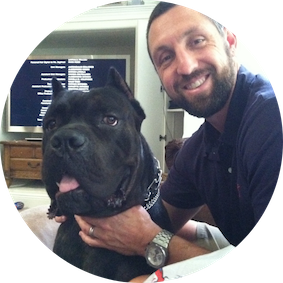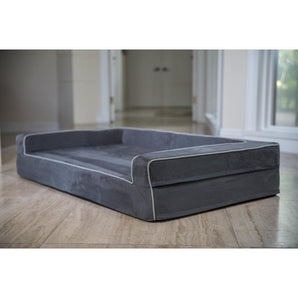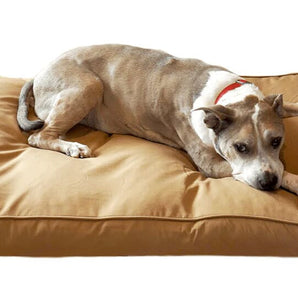5 Ways to Improve Your Dog's Sleeping Habits

Like humans, our pets become our children. And like children, they love to play, eat, make a mess, give lots of love and sleep right up under your nose.
While all of these things make a dog man's best friend, they all can be a handful at times - especially when you're trying to call it a night, take a nap, or even get some silent alone time. Have you ever settled down to sleep and your pet was working full throttle for some one on one action?
Does it seem like your dog just can't sleep on their dog bed when it's time to sleep? Have you ever wished your dog’s sleeping habits were corresponding with yours? If you’re reading this post, you’ve probably been there before. And are looking for any solution that will improve your dog’s sleeping habits. Look no further. Here are 5 ways to get your dog on the track to have less sleepless nights and more cuddle time.
Dozing:
Do you allow your dozing dog to sleep? If so, are you finding that your nap-happy dog is up and at it just as you’re ready to call it a night? A single nap for your dog is ok, but taking several naps can be too much. Dozing off is a sign of being tired or bored.
During the day time, it’s best to keep your dog up and active - especially when it is almost bedtime. This is an excellent indication that your dog is sleepy and ready for bed. Depending on the time of day, dozing off is perfect for a long night sleep. Your dog can also doze off when it’s just finished its food, which leads us to our next topic.
Feeding:
Like humans, it's best to eat well before your bedtime. Here are 3 reasons why it’s a bad idea to feed your dog before bedtime.
- Excess energy to burn in the night- Feeding your dog at night will give them the energy that they need to be extremely playful. That’s the energy that should normally be used during the day.
- Tired during the day- Dogs are recommended to be fed twice a day.. If you feed a dog too late in the day, they won’t have the energy to walk, exercise, and play throughout the day.
- Potty break- No doubt, that when you feed your dog close to bedtime, they will wake up in the middle of the night wanting to go to the potty. This action will for sure throw their sleeping pattern off.
A good workout during the day can always lead to a good night’s sleep. In addition to exercising, here are 3 techniques that can calm your dog down and help him sleep throughout the night. According to Victoria Stilwell, the 3 techniques are:
- Long strokes down the side of the face and/or body. Dogs will relax while being caressed.
- Massage the ears. Dog ears contain many nerve endings and can release endorphins into your dog’s body when you massage them. Slowly stroke the ears in a circular movement with your finger.
- Rub the chest. Gentle strokes on its chest in a circular motion will calm and relax the dog.
Some dogs have the luxury of sleeping with their owners or other members of the family. And like humans, having a comfortable place to sleep can make all the difference - which means bedding is very important. Some dogs have a preference, but for the most part, something soft and slightly firm will do the job. Providing a comfortable sleeping space will help your dog receive the proper rest, whether it’s for a nap or bedtime. Finding the right affordable dog bed for your dog can eliminate their craving to stay up and interrupt your good night’s sleep.
Health:
Knowing your dog’s health status will also help you discover any off-pattern sleeping behaviors. Humans aren’t the only ones who suffer from sleep problems. Dogs also display signs of a sleeping disorder. Dogs typically sleep between 12 to 14 hours a day. When dogs get a lack of sleep, it is very similar to when humans pull an all-nighter.
According to Bustle, the following are 5 signs to look for that may indicate that your dog has a sleeping disorder: Physical Activity During Sleep, Loud Snoring, Sudden Collapsing After Activity, Insomnia, and Pacing at Night.
Physical Activity During Sleep
If your dog always seems to be active in its sleep, it could be a sign that the dog is suffering from a sleeping disorder called REM Behavior Disorder (Rapid Eye Movement). This activity can be violent and extreme. If you notice signs, please consult a vet for medication.
Loud Snoring
Snoring loud in its sleep is a sign of sleep apnea. Sleep apnea is a potentially serious sleep disorder in which breathing repeatedly stops and starts. This sleeping disorder can result in lack of sleep for your dog.
Sudden Collapsing After Activity
If your dog is collapsing or falling over after a spurt of physical activity, it may be suffering from Narcolepsy. A dog with narcolepsy will suddenly collapse on its side and fall asleep, usually after excitement. The dog muscles become slack and the dog will appear to be in a deep sleep with REM.
Insomnia
Insomnia in dogs is rare. Insomnia is the most common sleeping disorder that can make it hard to fall asleep, hard to stay asleep, or causes you to wake up too early and not be able to get back to sleep. Older dogs typically suffer the most from this condition.
Pacing at Night/ Dementia
If older/senior dogs tend to pace and cry at night, it could be a sign of dementia. Although dementia is not a sleeping disorder, it is a term used for loss of memory, language, problem-solving and other thinking abilities. This may interfere with your dog's ability to sleep as well.
Dog Sleeping Behavior Tips:
There are many tips and tricks that will have your dog sleeping like a baby. You may be familiar with them or they may have been in plain sight but never crossed your mind.
Here are 5 additional tips to help your dog sleep soundly.
-
Be Consistent- “Same time on time.” Avoid middle of the night wake ups. Waking your dog up from sleep consistently creates a pattern that they’ll adjust to and becomes the new norm.
-
Let your Dog out Right before Bedtime- “Potty time before bedtime.” Once your day is over and you’re about to call it a night, allow your dog to have a “bedtime potty break,” then off to sleep you go.
-
Limit Water before Bed- “No water flow before hitting the pillow.” Like humans, dogs can wake up from their sleep having to go potty. To avoid this, your dog should stop drinking about two hours before bedtime.
-
Avoid Too Much Activity Before Bed- “Don’t play, it's time to stay”. Exercising and playing with your dog before bedtime will leave them wanting water and that will result in breaking their sleep for a potty run. Play during the day.
- Consider Your Own Sleep Habits- “Doggie see, Doggie Do.” Do you sleep well at night? Are you all over the place? Your dog will easily adjust to your routine and lifestyle. If you’re up all night then your dog will be too.




